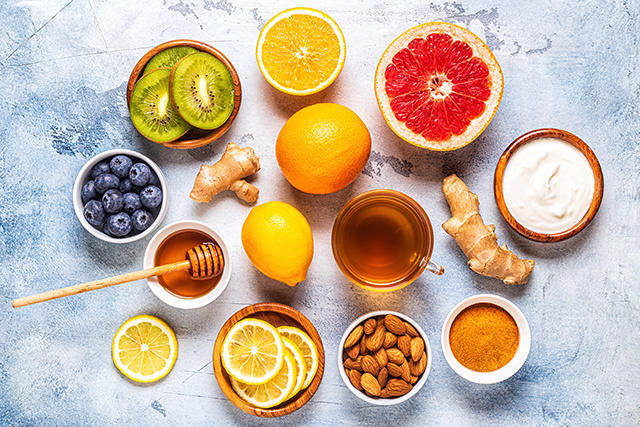No one likes being sick. But as the temperature drops and people start spending more time indoors, the risk of catching a cold, flu or other infection increases significantly. Your immune system is your first line of defense against sickness.
Learn how you can boost your immune system naturally with these tips.
Immune System 101
The immune system is a complex network of cells, organs and tissues that work together to help your body combat disease and infection.
Humans are born with some innate immunity. This includes skin, mucus membranes and the lymphatic system, which produces, stores and carries white blood cells that fight infections and other diseases. Acquired immunity happens when you get infected and recover from an illness or when you’re vaccinated.
There’s no quick trick or magical pill for developing a perfect defense against illness, but there are some steps you can take to boost your immune system naturally.
Get Your Probiotics
There’s still much to be learned about how gut flora and the immune system are linked. But probiotics, which strengthen the good bacteria in the gut, can help with digestion and better your immune system.
“There are two ways to get more good bacteria into your gut: fermented foods and dietary supplements. Fermented foods are the most natural source,” according to Harvard Health Publishing. “Probiotic supplements, which are typically sold over the counter, are reserved to treat specific ailments as suggested by your doctor, and not recommended for everyday use.”
Fermented Foods
Foods that typically contain probiotics are fermented foods like kimchi, pickles, sauerkraut, miso, tempeh, sourdough bread and some cheeses (cheddar, gouda, mozzarella). Just be aware of your salt intake. If you’d prefer to drink your probiotics, there’s kombucha – a fermented tea drink, and kefir – fermented milk.
Yogurt
Yogurt is touted as one of the best sources of probiotics. Different types and brands of yogurt boast different amounts of probiotics – anywhere from 90 billion to 500 billion colony-forming units per serving.
When it comes to eating yogurt, make sure to check the sugar content. Look for options with “active” or “live” cultures that have more protein than sugar.
Eat a Well-Balanced Diet
Go for Fruits and Vegetables
Eating a diverse diet provides your body with the nutrients it needs to support your immune system. You want to focus on eating a mix of whole foods, especially fruits and vegetables, which provide a wide array of vitamins, minerals and other nutrients.
“Malnutrition or a diet lacking in one or more nutrients can impair the production and activity of immune cells and antibodies,” according to Harvard School of Public Health. “Diets that are limited in variety and lower in nutrients, such as consisting primarily of ultra-processed foods and lacking in minimally processed foods, can negatively affect a healthy immune system.”
Stay Hydrated
There’s a reason why we’re told to drink plenty of fluids when we’re ill. To be proactive, get in the habit of drinking enough water everyday.
While drinking water alone doesn’t necessarily give your immune system a boost, water keeps our bodies functioning properly. Drinking water aids in digestion, helps carry nutrients and oxygen to your cells, protects organs and tissues, regulates your body temperature and more.

Know When to Supplement
Taking supplements may sound tempting – especially when some packaging makes flashy claims – but they may not be as beneficial as you’d think.
“Although some preparations have been found to alter some components of immune function, thus far there is no evidence that they actually bolster immunity to the point where you are better protected against infection and disease,” according to Harvard Health Publishing. “Demonstrating whether an herb – or any substance, for that matter – can enhance immunity is, as yet, a highly complicated matter.”
Correct Deficiencies
However, supplementing for nutrients you’re currently lacking can be beneficial. For example, many Americans are vitamin B6- and vitamin D-deficient. Some women ages 12 to 19 are iron-deficient. Talk to your doctor about any supplements you are – or potentially should be – taking. You may want to consider having bloodwork done to see if you have any deficiencies.
Support Your Immune System
There are five micronutrients – vitamins B6, C, E, magnesium and zinc – that help maintain immune function.
“Supplements containing them are often sold as immune boosters in doses that greatly exceed the recommended daily allowance. However, there is no evidence that such supplements have more benefits than merely following a healthy diet,” according to Harvard Health Publishing. “Rather than popping pills to get these micronutrients, you’re wiser to use various foods to boost your immune system.”
What’s more, supplements don’t have the same FDA oversight as medications, meaning it’s likely safer and more effective to get immune system-supporting vitamins naturally, from food.
Try eating more of these vitamin-rich foods:
Vitamin B6 – Bananas, lean chicken and pork, salmon, sweet potatoes, fortified tofu.
Vitamin C – Bell peppers, citrus fruits, guava, kiwi, strawberries.
Vitamin E – Almonds, avocados, butternut squash, spinach, sunflower seeds.
Magnesium – Brown rice, dark leafy greens, lima beans, squash and pumpkin seeds, tuna.
Zinc – Beef, chicken, pork, firm tofu, lentils, oysters.
Exercise and Maintain a Healthy Weight
“Just like a healthy diet, exercise can contribute to general good health and therefore to a healthy immune system,” according to Harvard Health Publishing. “It improves cardiovascular health, lowers blood pressure, helps control body weight and protects against a variety of diseases.”
On the other side of the spectrum, obesity – and the low-grade chronic inflammation associated with it – can hamper the immune system.
To stay active, exercise regularly by going on a bike ride a few times a week or taking a 20- to 30-minute daily walk. If it’s too cold outside, check out these ten indoor workouts to stay fit and boost immunity.
Save on Active&Fit Direct membership with AAA Discounts. Choose from thousands of fitness centers and studios nationwide and get access to thousands of guided workout videos.
Avoid Immune Suppressors
Too Much Stress
Stress weakens the immune system, according to numerous studies since the 1980s as well as psychologists in the field of psychoneuroimmunology.
Some stress is natural and largely unavoidable. But, “people who are older or already sick are more prone to stress-related immune changes,” according to the American Psychological Association.
Learn more about how too much stress impacts your health and ways to cope with daily stressors.
Unhealthy Substances
If you want your body to be able to defend itself, avoid consuming harmful substances. Protect your respiratory health by not smoking. And, if you drink alcohol, only drink in moderation.
“Clinicians have long observed an association between excessive alcohol consumption and adverse immune-related health effects such as susceptibility to pneumonia,” according to U.S. National Library of Medicine. “This association has been expanded to a greater likelihood of acute respiratory stress syndromes … and slower and less complete recovery from infection and physical trauma.”
Lack of Sleep
Sleep is an essential part of supporting your immune system. Getting enough high-quality sleep is proven to strengthen your body’s defenses and helps vaccines respond more efficiently.
Not enough sleep can even increase your chances of getting sick. “In the short-term, the risk of infections has been found to be higher in people who sleep less than six or seven hours per night. Studies have found that insufficient sleep makes it more likely to catch the common cold or the flu,” according to the Sleep Foundation.
How will you support your immune system this winter? Tell us in the comments.















